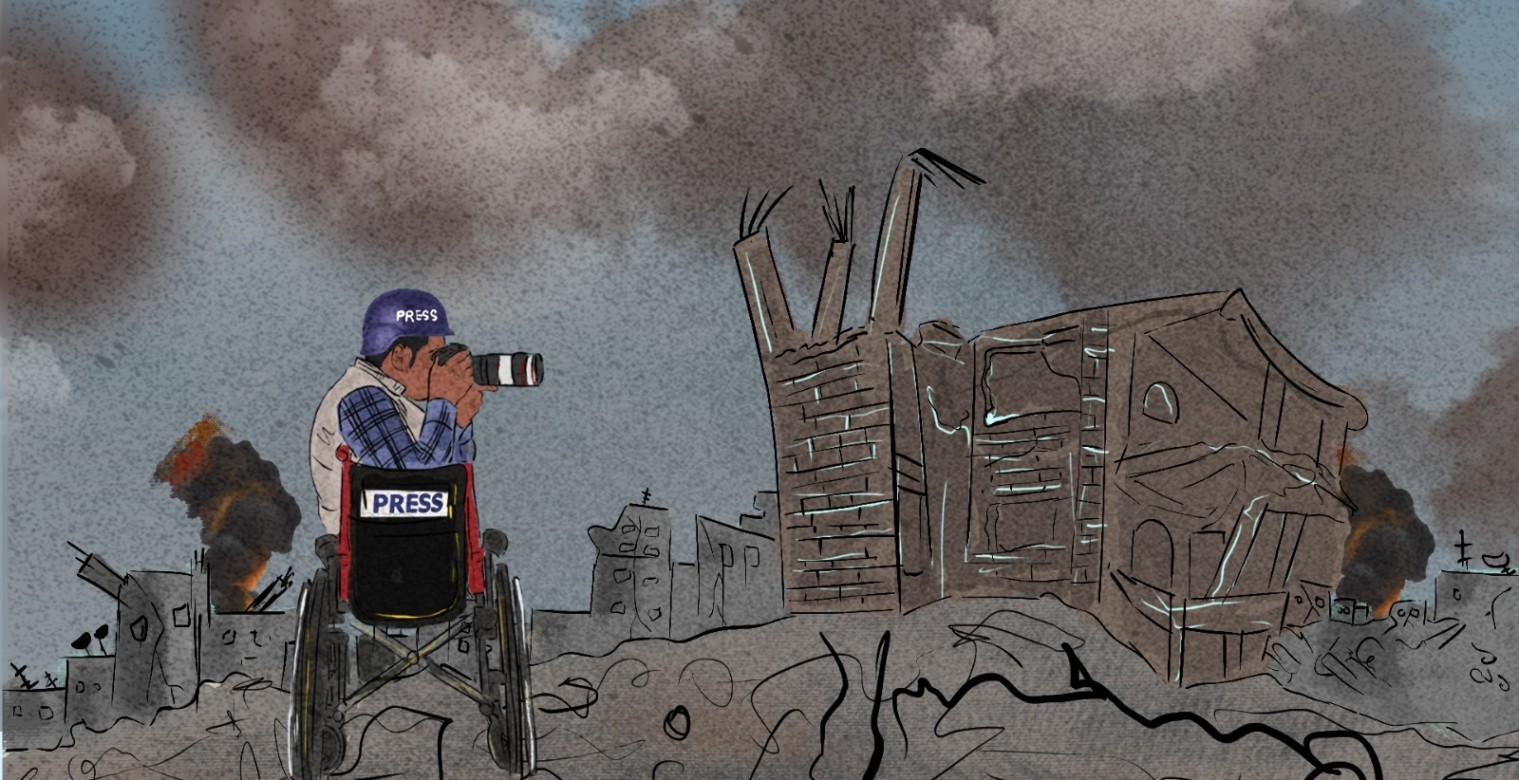With a prosthetic limb, Asmaa Abu Tair (34 years old) presses on the foot pedal of the sewing machine, and with limited movement ability in her hands, she passes the pieces as she tries to sew them.
Abu Tair practices a profession that Palestinian law describes as dangerous for her due to her disability. Despite her proficiency in this profession, she enrolled in the IRADA Center for the rehabilitation and training of people with disabilities, which specializes in rehabilitating and training people with disabilities.
She is one of the victims of the 2014 aggression that Israel launched on the Gaza Strip. The injury caused the amputation of her left foot, eroded her right foot, and left her hands weak.
Abu Tair was injured when Israeli warplanes launched airstrikes on her home in the Abasan Al-Kabira area in Khan Yunis, southern Gaza Strip.
She works in a space that doesn't exceed a few square meters on a sewing machine in a shop that she was able to set up for herself with the money she earned through hard work and dedication.
In an interview with "Last Story", she says, "Sewing is my only source of income. My husband doesn't work, and it takes a lot of money to support my children. Regarding my injury, its pain is increasing day by day, and I can do nothing for it except take painkillers."
As a result of the injury, Asma became one of the persons with disabilities, who make up 2.1% of the total Palestinian population, according to the statistics of the Palestinian Central Bureau of Statistics. Disabilities that affect mobility and hand dexterity are the most prevalent.
Abu Tair suffers from pain that has been exacerbated by the complications she suffers from the injury, especially in light of her sewing work, which requires using her prosthetic limb. After a long treatment journey, she was able to obtain a prosthetic replacement through the Hamad Rehabilitation and Prosthetics Hospital.
She says, "The prosthetic foot needs to be changed every once in a while, and I need to undergo more medical follow-ups now that I'm sewing." Despite Abu Tair's need to work, her health condition leads doctors to recommend that she stop working.
Abu Tair realizes that Palestinian law, as stated in Article (13), obliges business owners to employ people with limited physical abilities. The work must be compatible with their disability. She commented on the legal text, saying, "I don't work in sewing in violation of the law, but I asked for help from many governmental and private charitable agencies, but I did not receive any assistance, so I had to work by myself despite my disability."
She added, "I ask the concerned authorities to provide me with an income that allows me to dispense with this work, which I turned to due to financial difficulties."
Asmaa Abu Tair is not the only disabled person who continues to work despite the prohibition of life-threatening actions by Palestinian law. Moamen Quraiqa (33 years old) has also been working as a journalist for seventeen years, even after losing his feet in an Israeli raid in 2008 that hit the Shujaiya neighborhood in the eastern Gaza Strip.
Quraiqa sits in his wheelchair and covers events of any Israeli aggression launched against the Gaza Strip. He says, "My journalistic work is my only constant source of income and maintenance for my four children. I have no other assistant at work other than my wheelchair."
The Palestinian law obliges employers to employ persons with disabilities at a rate of no less than 5% of the size of the workforce in the establishment, and Article (16) prohibits any discrimination in terms and conditions of work in the Palestinian territories.
In view of that law, Qureiqa called for the integration of people with disabilities into both public and private institutions in the Gaza Strip, and granting them their rights in all areas of society, so that they become an integral part of decision-making.
In this context, the director of the community rehabilitation program at the Palestinian Medical Relief Society, Mustafa Abed, emphasized that the determination and persistence of people with disabilities enable them to work in all fields.
He said in an interview with "Last Story", "People with disabilities are an integral part of Palestinian society, and many of them are capable of creativity despite their disabilities." He added, "Despite that, we are against the practice of people with disabilities in jobs that risk their lives, and they must always be protected."
For his part, the director of the Labor Conditions Department at the Ministry of Labor, Hussein Haboush, confirmed that there are vacancies for people with disabilities in the temporary work projects that the Ministry of Labor is working on.
These projects employ many people in workplaces that are adapted to their specific disabilities, and work to provide them with job opportunities in local facilities. Habboush said, "There is a special inspection department in the Ministry of Labor that monitors all establishments and projects, and general control over them, and if there is a violation of the law, the necessary measures are taken."
Disability does not negate energy or ability, and many people with disabilities have enough determination and ability to achieve their ambitions and dreams, far from actions that lead them to perish. However, this requires a concerted effort from all the forces of society to support and protect people with disabilities, fulfill their requirements, and integrate them into relevant institutions, as part of our social responsibility.




